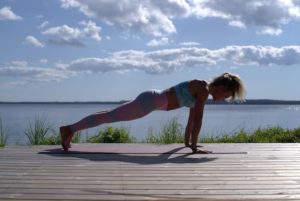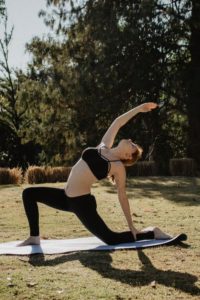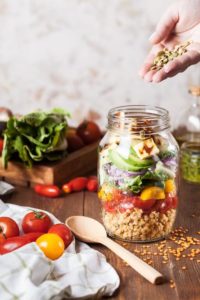What is Osteoporosis?
It is undoubtable that bones are an important part of our bodies.
If you give it a minute of thinking, bones make you stand tall, they protect your inner organs, give your body the shape it has, help you move around and give attachments to all your muscles.[1]
But… what if they become weak?
Osteoporosis is a bone disease or condition in which bone mass decreases making your bones more fragile and prone to injury and fractures. [2]
In fact, osteoporosis is a Latin word in which Osteo: means bones and porosis: means porous.
So, the whole word means porous bones.
The reason behind this name is that bones lose their density, they become more porous and brittle. [3],[4]
Who gets osteoporosis?
There are several risk factors that can make someone lose bones faster than another.
Here are some of these factors and things we cannot change; for instance:
- Age: As you grow older, your body loses more bone than it builds.
This increased turnover makes your bone fragile.
- Gender: Although men and women are both affected with osteoporosis, women can be more at risk because they have thinner bones compared to men, and because they lose bone faster after menopause age.
- Menopause: Again, estrogens secreted in your body help protecting your bones.
After menopause, estrogen hormones drop sharply and bone loss increases.
This is why there is an increased risk of osteoporosis after menopause.
- Genetics: Genes play an important role in determining your bone strength.
Research shows that if you have history of weak bones or frequent fractures in your family, you are more likely to have fragile bones at some point in your life. [2], [3]
 In addition to these risk factors, that are completely out of our control, there are other risk factors that we not only might be causing them, but we also can change them; for instance:
In addition to these risk factors, that are completely out of our control, there are other risk factors that we not only might be causing them, but we also can change them; for instance:
- Poor, unhealthy diet
- Lack of physical activity
- Lack of nutrition customisation for the challenges and goals you have
- Smoking
- Drinking alcohol [2],[3],[4]
In addition to some medical conditions and medications that increase your risk of bone fragility; for example:
- Digestive problems: conditions like celiac disease and irritable bowel syndrome can interfere with your absorption of calcium and minerals and can put you at risk for osteoporosis
- Treatment with steroids: prolonger treatment with steroids can also increase your risk for osteoporosis.
- Hormonal disturbances: Sex hormones disturbances, increased thyroid and parathyroid hormones can also be responsible for your weak bones. [2],[3],[4]
Are osteoporosis and osteoarthritis the same?
If you are one of those who cannot tell the difference between osteoporosis and osteoarthritis, or think they are both interchangeable, it is time to clear the misconception once and for all.
Now that you know what osteoporosis is, let’s learn more about osteoarthritis symptoms and nature.
What is Osteoarthritis?
Osteoarthritis is a common bone problem that has captured the world’s attention not only because of the pain it causes, but also because it causes a huge limitation in function and activities of daily life.
In Latin, osteo: means bone, arthro: means joint and itis: means inflammation.
So, based on what the name says, if you are thinking that it is a join problem in which the joint is inflamed, painful and restricted, you are totally right!
How does osteoarthritis happen?
Normally, your bones are connected together by joints with cushions in between; these cushions are called cartilage discs or cartilages.
They serve as shock absorbers, and they decrease the friction between bone surfaces as you move and bear weight.
As the time passes, the cartilage inside your joints undergoes wear and tear changes leading to:
- Friction between bones
- Inflammation of the synovium (the joint lining)
- Formation of osteophytes (bone spurs)
- Inflammation of the joint surface. [6]
What are the symptoms?
Unlike osteoporosis that can be asymptomatic, osteoarthritis has some symptoms that you would not miss.
They include:
- Pain and tenderness in the joint
- Stiffness
- Inflammation that gets your joint to swell
- Knobbly swellings around the joint line
- Limited joint movement
- Joint cracking and grinding. [6], [7]
How Customised Nutrition helps fight Osteoporosis and Osteoarthritis
 What you eat can determine how strong your bones are…
What you eat can determine how strong your bones are…
In fact, osteoporosis and osteoarthritis are two different bone conditions that require different diet for osteoporosis.
For instance, research shows that if your bone is fragile, you will need a bone-strengthening diet that will help you build bone and slow down bone loss. [8]
This diet must be rich in calcium and minerals (but not limited to) because these are how your body will build bones.
However, it is not only about calcium, your body will also need specific vitamins to be able to absorb and utilise the calcium you take.
For example, Vitamin D and Vitamin K. [8],[9]
On the other hand, research shows that osteoarthritis requires a completely different scope when it comes to nutrition.
Although damage from osteoarthritis is irreversible, adopting a laser sharp customised anti-inflammatory diet for osteoporosis or a diet rich in fruits and vegetables and Gluten Free Diet can help you reduce the symptoms.
As an example, research shows that bromelain, which is a coenzyme known for its anti-inflammatory and health benefits, caused a significant decrease in pain and stiffness in patients with knee osteoarthritis. [10]
Surprisingly, Bromelain can be generously found in pineapples and vegan broth!
Remember!
There is no one-diet-fits-all when it comes to bone health; not only because bone conditions are different, but also because every diet for osteoporosis plan you follow must be laser-sharp customised for your:
- Age
- Gender
- Health condition, mixtures of health complications and particular needs
- Food likes and dislikes
- Desired goals
Are you ready to transform your bones health?
Are you ready to transform your general health once and for all enjoying your very own customised diet for osteoporosis plan that contains custom-made recipes based on your own medical challenges, needs and food preferences?
This is what Jazz Alessi is ready to do for you, request a free consultation now!
Foods to Consume: Make the Right Choices
 When it comes to making the right food choices, you might wonder: Which Fats, Vitamins, Fibres and Supplements to Consume?
When it comes to making the right food choices, you might wonder: Which Fats, Vitamins, Fibres and Supplements to Consume?
It might be overwhelming because there is a countless number of foods out there with a countless number of nutrition advice that you do not know which fits you the best.
If this is the case, here I help you with my Harley Street nutrition expert advice:
- Eat the right fats
Consuming saturated fats increases blood cholesterol and helps inflammation kick in.
Research shows that this may worsen your osteoarthritis symptoms. [11]
This is why it is important to replace saturated fats (e.g., in fried food, processed meat and fast food) with unsaturated fats that are healthy and that help reducing cholesterol and LDLs (e.g., natural oils, nuts and avocado).[11],[12]
Also focus more on Polyunsaturated fats such as omega-3 that are crucial to bone formation and bone health.
These fatty acids are found in ground flax, chia seeds, hemp seeds and walnuts. [13]
Make sure you include these daily as part of your diet for osteoporosis or diet for osteoarthritis.
And remember, I advise you to grind your seeds to improve the bioavailability and absorption of the important nutrients. [13]
- Get the right nutritional supplements
Some nutrients might be hard to get from the food you eat.
Thus, it is important to include the right supplements your body needs in your diet plan.
- For instance, did you know that vitamin D, vitamin B12 and Vitamin K are important nutrients to focus on if you are osteoporotic?
These vitamins can be obtained in kale, spinach, broccoli, and brussels sprouts, but they can also be taken in clinical intakes as supplements in case of deficiency. [11], [12]
In addition, if you have digestive problems, your body might not be able to digest and absorb food.
This is when some dietary fibers become handy
Not sure which supplements to include in your diet for osteoarthritis?
Time to consult a long-term, the best London nutritionist and check what your body needs.
Request a FREE CONSULTATION NOW!
- Eat the right proteins
Proteins are present in both animal and plant-based foods…
But… which is better?
In fact, proteins are made of different amino acids that are either easy or hard to digest.
- Did you know that some amino acids (i.e., methionine and cysteine) contain a high amount of sulphur which produces sulphuric acids when being processed in our bodies? [13]
- Research shows that this sulphuric acid leads to calcium loss in the kidney, which leaves your bone less calcium to build bones.[13]
When compared, plant-based proteins were found to contain less sulphur compared to animal-source proteins [13]
If you are looking forward to improving your bone health with a diet for osteoporosis or a diet for osteoarthritis, make sure you include plant-based proteins in your diet; you can find them in vegetables and legumes like beans, lentils, soya, seeds as well as whole grains.
Foods to Avoid
Just as some foods can improve your general and bone health, some foods can negatively affect your condition and worsen your symptoms.
Foods to avoid include:
- Sugars (e.g., soft drinks)
- Saturated fats (e.g., in common cooking oils, butter and fats foods)
- Trans fats:
- Refined carbs (e.g., white bread, pasta and pastries)
- Any type of processed foods including vegan processed foods.
All these foods are known to be highly pro-inflammatory foods that trigger inflammation in the body and research shows that they are associated with an increased risk of metabolic disorders. [14]
But, what else inflammatory foods do?
Pro-inflammatory foods put you more at risk for obesity, diabetes, hypertension (high blood pressure), cancer and can also worsen the symptoms of arthritis and lead to more wear in the joint. [12],[14]
In addition, not only these foods, but also any foods that your body cannot digest can irritate your bowel and interfere with your absorption of the vitamins and minerals you need to maintain good bone health.
Make sure you enjoy a Gluten Free Diet that is customised specifically for you.
Request support from the best London nutritionist who will design for you massive nutrition variety plus a whole plan of laser-sharp customised recipes of foods that can improve your own health.
Consult Jazz Alessi FOR FREE NOW!
Synchronized Rehabilitation for Bone Health
 Usually, your doctor will closely monitor your health condition, adjust your doses and provide constant medical advice.
Usually, your doctor will closely monitor your health condition, adjust your doses and provide constant medical advice.
Meanwhile, your London personal trainer and expert London nutritionist will set your rehabilitation plan including the right exercises that are designed the best to match your fitness goals, protect and strengthen your joints and bones and improve your physical capacity.
This will be in addition to the laser-sharp customised diet for osteoarthritis that gives you healthy but tasty options up to your own liking and preferences.
That sounds great right?
But, imagine a perfect world where your long-term Harley Street nutritionist and elite personal trainer Jazz Alessi will work closely with your medical doctor (we provide you with expert medical supervision throughout) and you will get close and direct medical supervision over your rehabilitation plan.
Nothing can be more effective!
You will get all your questions answered:
Why Customised Recipes?
Jazz Alessi believes that everybody is different.
You might be allergic to foods, lacking a specific nutrient or a micronutrient, or you may simply hate the taste of some foods or just struggle with a mixture of health conditions.
Jazz believes that when the recipes are customised to your body, deficiencies, and taste, it will be more effective and you will be more likely to stick to the plan easily.
Why Customised Exercises?
Different exercises are used to serve different purposes and achieve different goals according to your symptoms, health condition and goals.
For instance, if you have osteoarthritis, Jazz will recommend you strengthening and stretching exercises to correct your muscle imbalances and increase joint support whilst safely strengthen your muscles and joints.
While if you have osteoporosis, he will recommend you a whole different set of exercises to increase your bone density and stimulate bone formation.
Why Customised Stress Relief?
People deal differently with their stresses; this is why Jazz considers the individual differences and the method that can relieve stress for you.
He might use stretching, breathing exercises, Yoga, Pilates or meditation in order to help you stress less or get rid of stress.
He might also use natural ingredients and supplements in your diet to improve your mental health and promote better sleep health (e.g., melatonin) and you enjoy medical supervision throughout.
Why Customised Lifestyle?
Your rehabilitation plan including both exercise schedule and diet plan easily fit in your life.
This is the only way you can make the commitment and follow the plan without feeling pushed beyond your ability.
For instance, Jazz fits your exercise plan into your schedule by making flexible session schedules at your London location or if you are not living in London he will train you 1-2-1 online (no classes – just you and him!), being available for questions, and prescribing effective no-equipment exercises you can do anywhere and anytime.
Why Your Commitment Always Helps You Transform Faster
The plan works the best when it is followed as is.
This is why making the plan easy for you to follow and commit to always yields better results and always in shorter times.
Why Giving You Customised Expert Knowledge for your Specific Case Empowering You To Succeed in the Long Term
Medical symptoms and medical conditions are complicated and different.
They might look similar when it comes to symptoms, but in terms of the pathology, they may have completely different pathologies.
This is why it is important to start your health rehabilitation with medical supervision and a nutrition and exercise expert teaching at reputable organisations like Cameron McKenna and universities like LSE who understands the roots of your problems and is able to find the right solutions for them.
In many cases, you may receive treatment, go for physiotherapy or follow a generalised rehabilitation programme and see no results.
Or your symptoms may improve for a short time then return to what they were or even worse.
This is because rehabilitation should not target your symptoms, but your problems to give you the long-lasting results you deserve.
Make sure you start right with the right personal trainer and nutrition expert; Jazz Alessi.
REQUEST A FREE CONSULTATION NOW!
Contact London’s Top Nutritionist for Guidance with Osteoporosis and Osteoarthritis
Osteoporosis and osteoarthritis are completely different bone problems.
But the thing they have in common is: both of them need to be addressed and dealt with through the right bespoke rehabilitation and nutrition programme under correct medical supervision.
For each condition, your rehab plan will be different and your nutrition will be custom-made to improve your symptoms and increase your functional capacity.
This is only achieved by getting a customised plan that considers your own goals, needs and preferences.
This way you will enjoy doing the things you are not able to do now like long mountain hiking, jogging, running and enjoy training and using your body without feeling that you are restricted and limited in your choices.
You and your body become balanced, strong, agile and flexible with less anxiety, depression and stress.
The process is safe throughout and you become strong and free with as many life choices you would like to have and fly free and feeling free like the eagle you are.
Who is Jazz Alessi?

Jazz is an elite personal trainer in London and a long-term Harley Street expert nutritionist who prioritises your specific health challenges, goals and designs your plan according to your own condition, problems and needs.
In addition to his long expertise in training athletes and the best injury rehab London trainer.
Jazz is well-known for his evidence-based bone-up programme that effectively helps preventing and reversing osteoporosis, strengthening your bones and increasing your bone density and return you to high intensity and safe fitness levels under direct medical supervision.
References
1- Frontera, Walter & Ochala, Julien. (2014). Skeletal Muscle: A Brief Review of Structure and Function. Calcified tissue international. 96. 10.1007/s00223-014-9915-y.
https://www.researchgate.net/publication/266680796_Skeletal_Muscle_A_Brief_Review_of_Structure_and_Function
2- B-loss (2010) –– CHAPTER 27—OSTEOPOROSIS AND OSTEOMALACIA
https://www.hopkinsmedicine.org/geriatric_medicine_gerontology/_downloads/readings/section7.pdf
3- Pouresmaeili F, Kamalidehghan B, Kamarehei M, Goh YM. A comprehensive overview on osteoporosis and its risk factors. Ther Clin Risk Manag. 2018 Nov 6;14:2029-2049. doi: 10.2147/TCRM.S138000. PMID: 30464484; PMCID: PMC6225907.
https://www.ncbi.nlm.nih.gov/pmc/articles/PMC6225907/
4- International osteoporosis foundation –– World Osteoporosis Day Campaign Toolkit
https://www.osteoporosis.foundation/sites/iofbonehealth/files/2022-05/WOD%20Toolkit_Final.pdf
5- Pereira, Duarte & Ramos, Elisabete & Branco, Jaime. (2014). Osteoarthritis. Acta medica portuguesa. 28. 99-106. 10.20344/amp.5477.
https://www.researchgate.net/publication/274260155_Osteoarthritis
6- Coaccioli, S.; Sarzi-Puttini, P.; Zis, P.; Rinonapoli, G.; Varrassi, G. Osteoarthritis: New Insight on Its Pathophysiology. J. Clin. Med. 2022, 11, 6013.
https://doi.org/10.3390/jcm11206013
7- NHS –– Symptoms of osteoarthritis
https://www.nhs.uk/conditions/osteoarthritis/symptoms/
8- Gasperoni, Lorenzo. (2020). Vitamin K and Osteoporosis. 10.3390/nu12123625.
https://www.researchgate.net/publication/346957015_Vitamin_K_and_Osteoporosis
9- National Osteoporosis Foundation –– Your guide to a bone healthy diet
https://www.bonehealthandosteoporosis.org/wp-content/uploads/2016/04/Healthy-Bone-Brochure_FINAL.pdf
10- Rathnavelu, Vidhya & Alitheen, Noorjahan & Sohila, Subramaniam & Samikannu, Kanagesan & Ramesh, Rajendran. (2016). Potential role of bromelain in clinical and therapeutic applications (Review). Biomedical Reports. 5. 10.3892/br.2016.720.
https://www.researchgate.net/publication/305414285_Potential_role_of_bromelain_in_clinical_and_therapeutic_applications_Review
11- the association of UK dieticians – Osteoarthritis and diet: Food Fact Sheet
https://www.bda.uk.com/resource/osteoarthritis-diet.html
12- Hsu, Emory. (2020). Plant-based diets and bone health: sorting through the evidence. Current Opinion in Endocrinology, Diabetes & Obesity. 27. 248-252. 10.1097/MED.0000000000000552.
https://www.researchgate.net/publication/342579431_Plant-based_diets_and_bone_health_sorting_through_the_evidence
13- plant-based health professionals UK –– Lifestyle factors for better Bone health for health professionals
https://plantbasedhealthprofessionals.com/wp-content/uploads/BoneHealthHPs24.02.21.pdf
14- Piccand E, Vollenweider P, Guessous I, Marques-Vidal P. Association between dietary intake and inflammatory markers: results from the CoLaus study. Public Health Nutr. 2019 Mar;22(3):498-505. doi: 10.1017/S1368980018002355. Epub 2018 Oct 18. PMID: 30333073.https://pubmed.ncbi.nlm.nih.gov/30333073/



